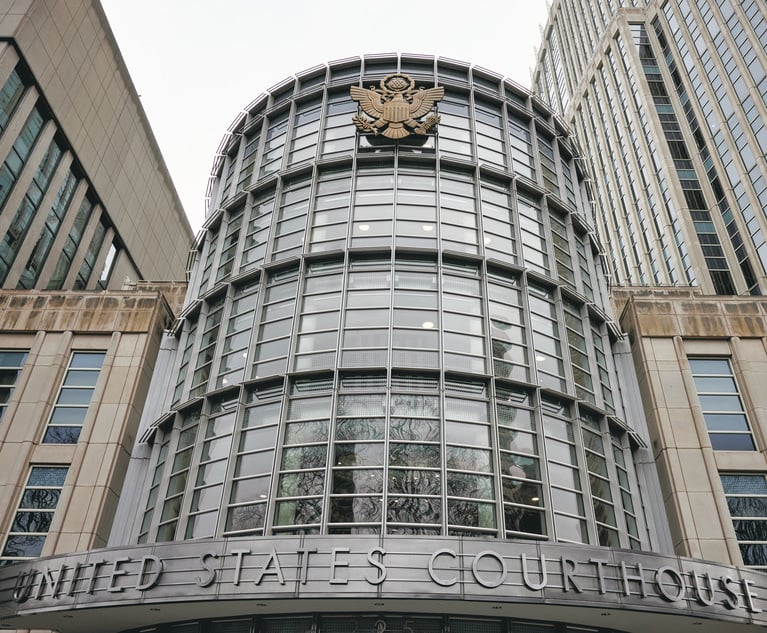To Tweet, or Not to Tweet. That Is the Question (for Law Professors)
More law professors have jumped on the Twitter bandwagon, said Bridget Crawford, a professor at Elisabeth Haub School of Law at Pace University, who compiled the data.
September 19, 2019 at 09:00 AM
5 minute read
The original version of this story was published on Law.com
Law professors are trained to share their thoughts in lengthy, exhaustively footnoted journal articles. So it makes sense that the legal academy as a whole was initially reluctant to embrace Twitter, a medium that forces users to be concise and where the conversation can be bare-knuckled.
But it seems law professors are finally coming around to Twitter. A recent census of law professors on Twitter found that at least 1,310 are on the platform, which represents an increase of more than 500% from 2012, when just several hundred were tweeting.
More law professors have jumped on the Twitter bandwagon as they have watched early adopters use the platform in a variety of ways: From promoting their own work or offering commentary on the news of the day to connecting with others in their field or even engaging with the general public, said Bridget Crawford, a professor at Elisabeth Haub School of Law at Pace University, who compiled the data.
"For me, I often use Twitter to comment about things that are in the news," Crawford said. "Jeffrey Epstein, for example. When he committed suicide and it was revealed that he had executed his will two days before, I was tweeting a lot about that. And that's not something I would have written about in a scholarly article. I tend to use it for things my students would be interested in, or things that we covered in class."
Crawford said she has even experimented with using Twitter in the classroom, asking students to live tweet questions during her lecture, but deemed the test a failure.
Crawford cautioned that the Twitter census, published on The Faculty Lounge blog, isn't perfect. The data is self-reported by professors on Twitter, thus it likely undercounts the accounts of actual of law professors using the platform. (It only counts full-time law professors.) And she did not independently verify the data.
While imperfect, the numbers point to a steady adoption over time. Crawford tracked 204 law professors on Twitter in 2012, which more than doubled to 550 in 2015. In 2018, 1,105 reported to Crawford that they were on Twitter, with the latest figure coming in at 1,310. Crawford said she began the census out of curiosity over how many colleagues were tweeting.
To be sure, the number of law professors on Twitter is still a relatively small slice of the legal professoriate as a whole. According to the Association of American Law Schools, there were 9,666 full-time law professors in the U.S. in 2018. That means just 11% reported using Twitter this year. (That percentage takes into account that 276 of the professors appearing on the Twitter census are based outside of the U.S.)
And there is a healthy debate among legal academics over whether Twitter is actually useful, and how the platform should be leveraged. University of North Carolina School of Law professor Carissa Byrne Hessick wrote a widely discussed article in the Marquette Law Review in 2018 that urged fellow professors to be cautious in their Twitter use and refrain from offering legal takes in areas where they have no expertise. The article also encouraged tweeting law professors to avoid snark and strive to preserve the standing of the legal profession by remaining civil on the platform. The potential pitfalls of Twitter have likely convinced some law professors to stay away, Crawford said.
"Not everyone is comfortable going out with commentary," she said. "Not everyone is comfortable with the personal criticism that often comes. Anytime you put yourself on social media, there will be quite a few things to deal with. It's not for everyone."
Women law professors appear to be using the platform at a higher rate. They account for 39% of full-time faculty, according to the AALS, yet comprise 46% of the Twitter users identified in the census.
Crawford did not collect data on which law professors have the most Twitter followers, though Ryan Whalen, a law professor at the University of Hong Kong, used Crawford's 2018 census data for a deeper analysis of the legal education Twittersphere. He found that Harvard Law professor and activist Larry Lessig by far had the most followers, at 358,128. (Lessig's follower count has remained fairly steady since then.)
Behind Lessig was Joyce White Vance, a former U.S. attorney for the Northern District of Alabama who now teaches at the University of Alabama and appears on MSNBC. Vance has since overtaken Lessig with 364,929 followers and tweets frequently about current events as well as criticism of President Donald Trump. The third most-followed law professor last year was Zephyr Teachout. The Fordham professor has nearly 108,000 followers and has run unsuccessfully for several New York offices in recent years.
Despite the rise of competitors such as Snapchat and Instagram, Crawford said she expects law professors to mostly stick to Twitter for the time being.
"There are a proliferation of platforms, but I don't think any of them yet have the traction that Twitter does, at least among professionals," she said. "For now, the more scholarly conversations are on Twitter."
This content has been archived. It is available through our partners, LexisNexis® and Bloomberg Law.
To view this content, please continue to their sites.
Not a Lexis Subscriber?
Subscribe Now
Not a Bloomberg Law Subscriber?
Subscribe Now
NOT FOR REPRINT
© 2024 ALM Global, LLC, All Rights Reserved. Request academic re-use from www.copyright.com. All other uses, submit a request to [email protected]. For more information visit Asset & Logo Licensing.
You Might Like
View All
NY Appellate Panel Cites Student's Disciplinary History While Sending Negligence Claim Against School District to Trial

'No Evidence'?: Big Law Firms Defend Academic Publishers in EDNY Antitrust Case
3 minute read
'Substantive Deficiencies': Judge Grants Big Law Motion Dismissing Ivy League Price-Fixing Claims
3 minute read
Lippman Study on Antisemitism at CUNY Weighs Free Speech, Unprotected Acts
Trending Stories
Who Got The Work
Michael G. Bongiorno, Andrew Scott Dulberg and Elizabeth E. Driscoll from Wilmer Cutler Pickering Hale and Dorr have stepped in to represent Symbotic Inc., an A.I.-enabled technology platform that focuses on increasing supply chain efficiency, and other defendants in a pending shareholder derivative lawsuit. The case, filed Oct. 2 in Massachusetts District Court by the Brown Law Firm on behalf of Stephen Austen, accuses certain officers and directors of misleading investors in regard to Symbotic's potential for margin growth by failing to disclose that the company was not equipped to timely deploy its systems or manage expenses through project delays. The case, assigned to U.S. District Judge Nathaniel M. Gorton, is 1:24-cv-12522, Austen v. Cohen et al.
Who Got The Work
Edmund Polubinski and Marie Killmond of Davis Polk & Wardwell have entered appearances for data platform software development company MongoDB and other defendants in a pending shareholder derivative lawsuit. The action, filed Oct. 7 in New York Southern District Court by the Brown Law Firm, accuses the company's directors and/or officers of falsely expressing confidence in the company’s restructuring of its sales incentive plan and downplaying the severity of decreases in its upfront commitments. The case is 1:24-cv-07594, Roy v. Ittycheria et al.
Who Got The Work
Amy O. Bruchs and Kurt F. Ellison of Michael Best & Friedrich have entered appearances for Epic Systems Corp. in a pending employment discrimination lawsuit. The suit was filed Sept. 7 in Wisconsin Western District Court by Levine Eisberner LLC and Siri & Glimstad on behalf of a project manager who claims that he was wrongfully terminated after applying for a religious exemption to the defendant's COVID-19 vaccine mandate. The case, assigned to U.S. Magistrate Judge Anita Marie Boor, is 3:24-cv-00630, Secker, Nathan v. Epic Systems Corporation.
Who Got The Work
David X. Sullivan, Thomas J. Finn and Gregory A. Hall from McCarter & English have entered appearances for Sunrun Installation Services in a pending civil rights lawsuit. The complaint was filed Sept. 4 in Connecticut District Court by attorney Robert M. Berke on behalf of former employee George Edward Steins, who was arrested and charged with employing an unregistered home improvement salesperson. The complaint alleges that had Sunrun informed the Connecticut Department of Consumer Protection that the plaintiff's employment had ended in 2017 and that he no longer held Sunrun's home improvement contractor license, he would not have been hit with charges, which were dismissed in May 2024. The case, assigned to U.S. District Judge Jeffrey A. Meyer, is 3:24-cv-01423, Steins v. Sunrun, Inc. et al.
Who Got The Work
Greenberg Traurig shareholder Joshua L. Raskin has entered an appearance for boohoo.com UK Ltd. in a pending patent infringement lawsuit. The suit, filed Sept. 3 in Texas Eastern District Court by Rozier Hardt McDonough on behalf of Alto Dynamics, asserts five patents related to an online shopping platform. The case, assigned to U.S. District Judge Rodney Gilstrap, is 2:24-cv-00719, Alto Dynamics, LLC v. boohoo.com UK Limited.
Featured Firms
Law Offices of Gary Martin Hays & Associates, P.C.
(470) 294-1674
Law Offices of Mark E. Salomone
(857) 444-6468
Smith & Hassler
(713) 739-1250







